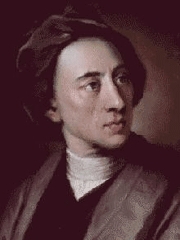On this date in 1688, Alexander Pope was born in England. He was educated in Catholic schools. Pope contracted tuberculosis with the complication of Pott’s disease, or TB of the spine, giving him a hunchback and an adult height of 4 feet, 6 inches. Despite health problems, Pope was a published poet by his teens. He became his generation’s most-respected and popular poet, able to support himself with his writings. A deist and poet of the Enlightenment, his most famous couplet is “Know then thyself, presume not God to scan / The proper study of mankind is man.” (“Essay on Man,” 1733.)
“Essay on Man“ also contains the lines: “For modes of faith let graceless zealots fight / He can’t be wrong whose life is in the right.” Pope also wrote: “Slave to no sect, who takes no private road / But looks through Nature up to Nature’s God.”
Pope’s “Universal Prayer” (excerpt below) was likewise deistic. Pope contributed many immortal phrases, such as “damn with faint praise” (“Satires and Epistles, Prologue to Dr. Arbuthnot”), “a little learning is a dangerous thing” and “To err is human / to forgive divine” from “An Essay on Criticism.” (D. 1744)


